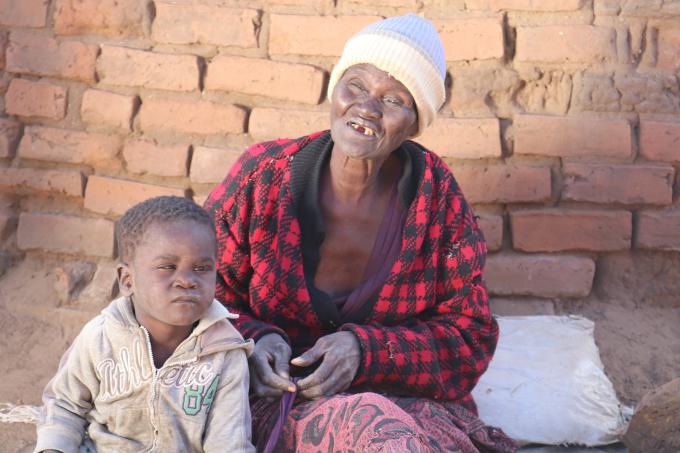Elderly couple desperate for food amid a coronavirus pandemic
Leonora (65) lives with her husband and three-year-old grandson, Shadreck in a remote village located in the northern side of Zimbabwe. She is blind and her husband is chronically ill.
Due to old age, disability and sickness, the couple cannot grow crops for consumption in the fields and they struggle to get food to survive. Leonora says they depend on wild fruits such as baobab fruit.
“I am blind and that is my main problem. My husband is sick, he has back problem and swollen feet. Both of us cannot farm”
“We rely on well-wishers who give us food. I usually survive on masau (wild fruit) and mawuyu (baobab fruit), which I pound to a soft powder which I then cook.”
Leonora and her family have been surviving on food vouchers under the ECHO-funded REACH project. The food distributions under this project ended in April 2020.
“I was being given maize-meal, dried fish, cooking oil and beans. I just heard that people’s names were being written at the village meeting point and my National Identity document was needed by the donors. So I sent my identity document and that is how I was registered for the food aid programme.”
Leonora now gets a bag of maize from a government scheme but cannot afford to buy other food items or soap. The economic crisis and hyper-inflation in Zimbabwe means food prices are constantly on the rise and beyond the reach of many. The situation is worse for elderly people like Leonora, orphaned and vulnerable children and those who are terminally ill. Leonora is concerned about getting food to feed her grandson Shadreck, who was abandoned by his mother when he was only 1 year 4 months old.
"I am grateful to the donor (ECHO) for having given us food for sometime, but the food is now finished. Go and tell the donor that there is a blind woman who says she is now hungry and wants th be assisted to survive. I have run out of ideas"
"I am just waiting and looking up to God to help us and give us food or else we die. My major problem is getting food for my my grandson. My son (Shadreck's father) has nothing also. His cotton crop was a total disaster"
Leonora has heard about Coronavirus, but doesn’t know much about the disease and that it has no treatment. She missed the community meeting called by the Ministry of Health and Child Care, where people were told about Coronavirus and also given tablets to protect them from bilharzia. Leonora however believes the ministry of health was distributing coronavirus tablets.
“I have heard that there is a new disease called Coronavirus. I heard that it easily spreads from one person to another. I failed to attend the community meeting in the village where people were told about the new disease and being given tablets to protect them from the disease.”
Zimbabwe has been facing an unprecedented food crisis, driven by climate-related disasters including widespread drought. Many hard-hit families are being forced to take desperate measures to survive such as reducing their daily meal intake, selling off livestock and other assets, migrating unsafely to other countries and taking their children out of school to work. In addition, the country is also grappling to cope with the COVID-19 emergency, amid a food crisis and a failing economy.
Save the Children and its implementing partners World Vision and Care have been supporting over 80 000 vulnerable and food insecure families through its food and cash transfer project in Mbire, Matobo, Mwenezi and Beitbridge districts, as well as distributing COVID-19 Personal Protective Equipment and other materials. Leonora received food hampers each month, received information about Coronavirus and how she can protect herself and her grandson, and was given a face mask for her use.
 Zimbabwe
Zimbabwe 